


| Answer: |




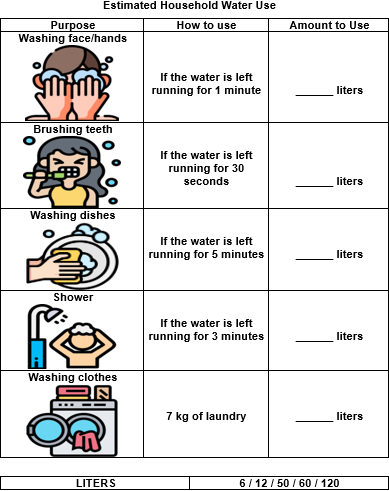
Brushing teeth: _____________ liters
Washing dishes: _____________ liters
Shower: _____________ liters
Washing clothes: _____________ liters


Now let’s take a look at the estimated amount of water use.
Do these match your prediction?
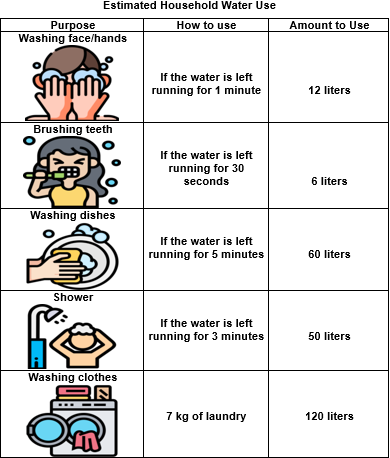

| Answer: |


| Answer: |



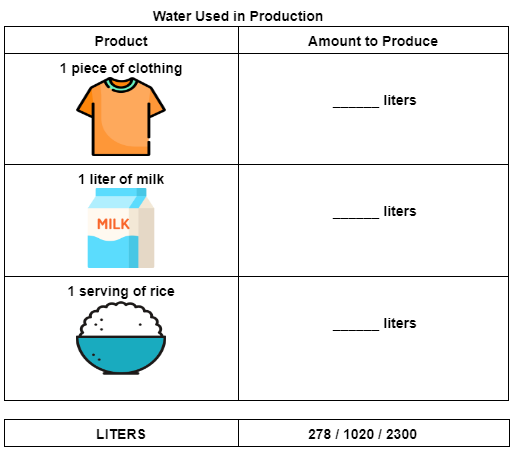
1 liter of milk: _____________ liters
1 serving of rice: _____________ liters


Here is the estimated amount of water used for each production.
Do these match your prediction?
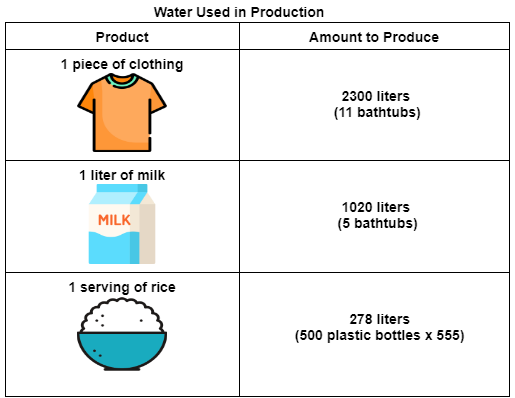

| Answer: |


| Answer: |



| I think I use much water for _______________ and _______________. Because ________________________________. |
| Daily activities that I can save water are ________________. |
| – When: ____________________. – Where: ____________________. – How: ____________________. – How much water you can save: ____________________. |




| Opening | It is said that we can use only 0.01 percent of the water on Earth in our daily lives. Today, I would like to talk about how we can save water. |
| Body | I realized how much water we use in our daily lives. I think I use much water for the purposes of _______________ and _______________. Because ________________________________. Daily activities that I can save water from are ________________. ① (when) ② (where) ③ (how) ④ (how much water I can save) |
Closing | There are already many people experiencing water shortages all over the world. Why not use water carefully every day? |




| Answer: |


What things do you recycle at home?
Why do you think recycling is important?
| Answer: |

kj24_flx1_8



| Answer: |



Take a look at what these robots are used for.
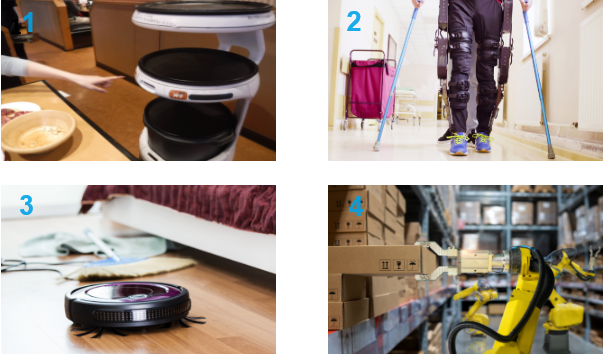

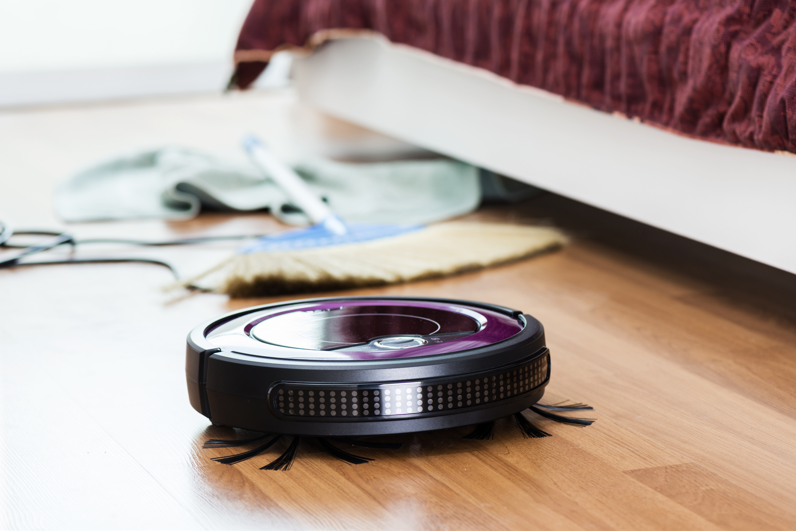
| What is this robot for? |
| – For medical treatment |
| – For serving food |
| – For cleaning rooms |
| – For picking packages |
| Answer: |


| What does it look like it’s doing? |
| Answer: |



| What is this robot for? |
| – For medical treatment |
| – For serving food |
| – For cleaning rooms |
| – For picking packages |
| Answer: |


| What does it look like it’s doing? |
| Answer: |


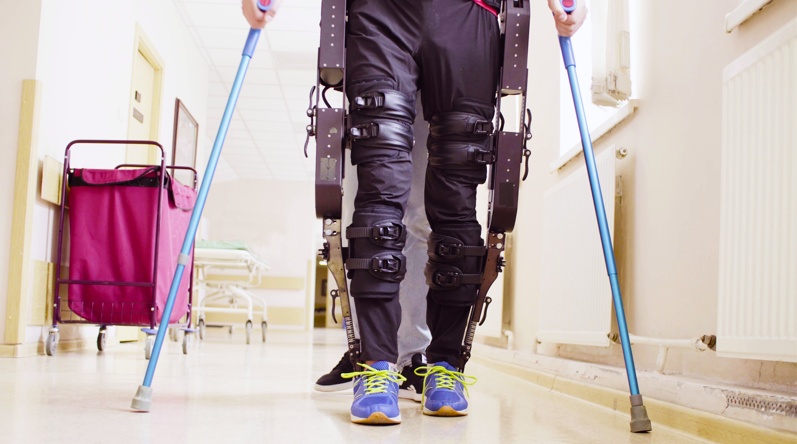
| What is this robot for? |
| – For medical treatment |
| – For serving food |
| – For cleaning rooms |
| – For picking packages |
| Answer: |


| What does it look like it’s doing? |
| Answer: |



| What is this robot for? |
| – For medical treatment |
| – For serving food |
| – For cleaning rooms |
| – For picking packages |
| Answer: |


| What does it look like it’s doing? |
| Answer: |


B_18



| This is a food-serving robot. Have you ever seen it? |
| Answer: |


| Who will be affected by the use of this robot? |
| Answer: |


| What are the advantages for a restaurant owner of using this robot? |
| Answer: |


| What are the disadvantages for workers? |
| Answer: |


| In your opinion, should this robot be used in more restaurants? Why or why not? |
| Answer: | |
| Because |


Then, please choose one of the robots below and tell me its advantages and disadvantages.


| Which of these robots do you think has the biggest impact on your daily life? |
| Answer: |


| Why do you think so? |
| Answer: |


| What are the advantages of that robot? |
| Answer: |


| What are the disadvantages of that robot? |
| Answer: |


| In your opinion, should that robot be used more? Why or why not? |
| Answer: | |
| Because |



| I would like to create a robot that ________________________________. |


| What activity/job would the robot be able to do? |
| Answer: |


| What kind of people would the robot be able to help? |
| Answer: |


| What are the advantages and disadvantages of the robot? |
D_8
| Advantages: |
| ① |
| ② |
| Disadvantages: |
| ① |
| ② |


| How much would you price the robot? |
| Answer: |




| Opening | The robotics market is said to grow more in the near future. Today, I would like to introduce a robot I would like to create. |
| Body | I would like to create a robot that __________________________________. What it can do: It can __________________. Who can be helped: ____________________ are helped by the robot. The advantages of the robot are: ① _____________________________ ② _____________________________ The disadvantages of the robot are: ① _____________________________ ② _____________________________ The price of the robot is ______________ yen. |
Closing | Robots can be very useful if used well, making our lives more convenient and safer. Thank you for listening. |




| What robot would you like to have at home? Why? How can it help you? |
| Answer: |


| What kind of job cannot be replaced by robots? Tell me anything you can think of. Why do you think so? |
| Answer: |

kj24_flx1_6



| Nice to meet you too, ________. What are you going to do this weekend? |
| Answer: |



| Let’s talk about the SDGs. First, I will ask you some questions. Which of the following goals are you interested in? |
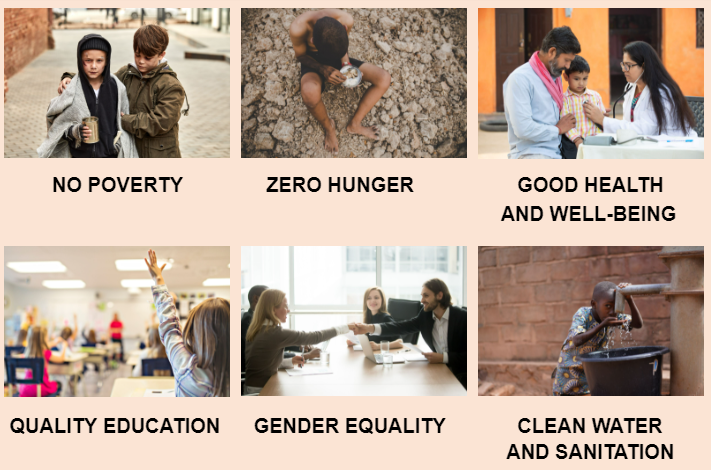
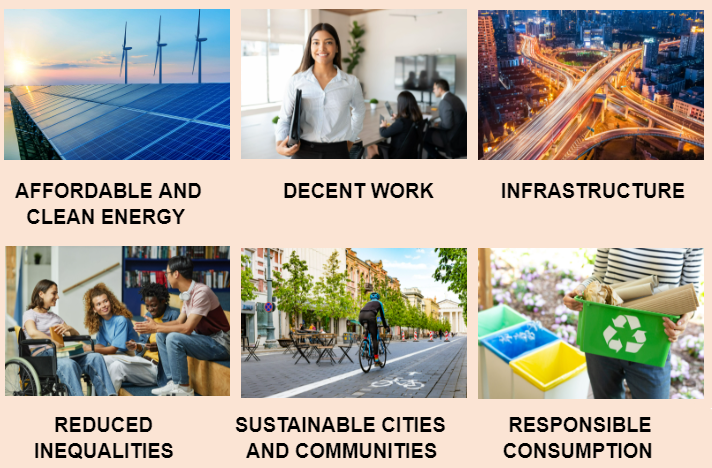
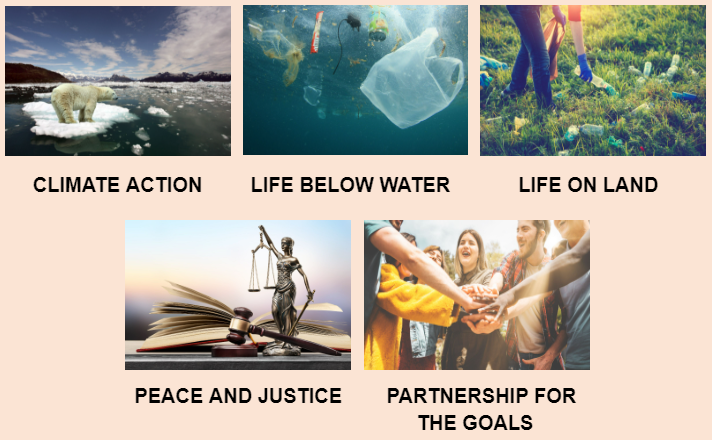





| I see. Do you think there is anything we can do to help solve the problem? |




As consumers, we can help by recycling things and making sustainable choices.
For example, you may recycle plastics or bring your own bottle when going out. You may also buy and sell clothes in second-hand clothing stores.


| Do you often use plastic bottles or do you bring your own bottles? Why? |
| Answer: |


| Which do you prefer, second-hand clothing or fast-fashion clothes? Why? |
| Answer: |


| What actions do you think we can take to reduce waste? |
| Answer: |


Next, please read aloud the passage below.

Climate change is now causing extreme weather, melting polar ice, an increase in endangered species, and so on.


| What kind of extreme weather are you most concerned about? Why? |
| Answer: |


| To prevent global warming, it is important for us to use less energy. What actions do you think we can take in our daily life? |
| Answer: |



D_2
| I’m interested in _____________________ of the Sustainable Development Goals. Because _____________________. |
| I think we can _____________________ to help solve that problem. |
| – When: ____________________. – Where: ____________________. – What: ____________________. – How: ____________________. |




| Opening | Today, I would like to talk about the Sustainable Development Goals. |
| Body | I am interested in _____________________ of the Sustainable Development Goals. Because _____________________. I think we can _____________________ to help solve that problem. ① (when) ② (where) ③ (what) ④ (how) |
Closing | There is always something we can do to help. Let’s take action right now! |




Tell me anything you can think of.
For example: bring your own reusable bag when you go shopping
| Answer: |


| Answer: |

kj24_flx1_5



| Nice to meet you too, ________. How was your weekend? What did you do? |
| Answer: |



B_1
B_2

|
TUTOR:
|
Do you know which of the World Heritage Sites listed above are cultural and which are natural? |
|
STUDENT:
|
I think number 3 is a Cultural World Heritage Site. What do you think? |
|
TUTOR:
|
I agree with you. It’s a Cultural World Heritage Site. |

B_3


|
TUTOR:
|
Do you know which of the World Heritage Sites listed above are cultural and which are natural? |
|
STUDENT:
|
I think ___________________________. What do you think? |
|
TUTOR:
|
I ____________ with you. It’s a Cultural/Natural World Heritage Site. |


B_4


| 1. | Which World Heritage Sites would you like to tell me about? |
| Answer: | |
| 2. | Is it a Cultural or Natural World Heritage Site? |
| Answer: | |
| 3. | Why did you choose it? |
| Answer: | |
| 4. | Where in Japan is it located? |
| Answer: | |
| 5. | Why is it a Cultural/Natural World Heritage Site? |
| Answer: | |
| 6. | What can we do there? |
| Answer: | |
| 7. | Have you ever been there? If yes, what did you think when you went there? If not, do you want to go there? Why or why not? |
| Answer: |



| I’d like to introduce you to ___________, a Cultural/Natural World Heritage Site in Japan. |
| It is located in ____________, Japan. It is about ________ away from where I live. |
| Because _____________, this location is on the Cultural/Natural World Heritage Site List. |
| You can ___________________________ there. |
| I have been there before. The scenery at the site is very beautiful. or I have not been there yet, but I would like to go there one day. |


D_3



| Opening | Today, I would like to introduce you to a World Heritage Site in Japan. |
| Body | ① (name of the heritage site) ② (location) ③ (reason) ④ (what people can do there) ⑤ (if you have or have not been there yet) |
Closing | When you come to Japan, please visit Japan’s World Heritage Sites. Thank you for listening! |

E_3
Now, it’s your turn. You will give a presentation.

| Opening | Today, I would like to introduce you to a World Heritage Site in Japan. |
| Body | It’s _____________________________. It is located in ______________________. Because _______________________________. You can ______________________________. I have (been/never been) there. ____________________________________ ____________________________________ |
Closing | When you come to Japan, please visit Japan’s World Heritage Sites. Thank you for listening! |



F_1

Which World Heritage Sites do you want to visit? Why?
| Answer: |


Did you enjoy it? What did you do there? What did you learn?
| Answer: |

kj24_flx1_4



| Nice to meet you too, ________. What’s your plan for this weekend? |
| Answer: |




The power of the voice of education is strong. So, it’s now time to speak up. We want all governments to provide free education for all children everywhere in the world. We want all governments to fight terrorism and violence. To defend children from danger and brutality. We want all communities to be accepting and to avoid judging people based on social class, race, religion, or gender so women can have freedom. We cannot succeed when half of us are held back. We encourage all of our women to embrace their inner power, be courageous, and reach their greatest potential.
Every child should have access to quality educational opportunities. We have faith in the strength of our words. Because we are all working together to further the cause of education, our words have the power to affect the entire world. Please pick up our books and pens. They are the strongest tools available. The world can be changed by just one child, one teacher, one book, and one pen. Education is the only solution.




| Who are the other half of us? What do we encourage them to do? |
| Answer: |


| What can change the world? |
| Answer: |




| Do you think that education is the only solution? Why or why not? |

| Yes. |
| Reason: __________________________________________________________ ___________________________________________________________________. |


| No. |
| Reason: __________________________________________________________ ___________________________________________________________________. |




E_2
| ① I believe that every boy and girl in the world should have access to education. |
| ② I believe that if everyone has one book and one pen, we can make the world a better place. |
| I believe that _____________________________________________________. |
| Because ___________________________________________________________. |



F_1

F_2

| Opening | Today, I am going to talk about why education is important. |
| Body | ① (your opinion) I believe that every boy and girl in the world should have access to education. ② (reason) Because it’s fair and it helps everyone have the opportunity to find good jobs. If they get good jobs, they will flourish all over the world and make society better. |
Closing | This is my opinion on the importance of education. Thank you for listening! |


| Opening | Today, I am going to talk about why education is important. |
| Body | I believe that _______________________________. Because ____________________________________. |
Closing | This is my opinion on the importance of education. Thank you for listening! |




If yes, why? What benefits do you think learning new things gives you?
If not, why not? What do you enjoy most about your school life?
| Answer: |


What do you think they can be used for in the future?
| Answer: |

kj24_flx1_3



| Answer: |



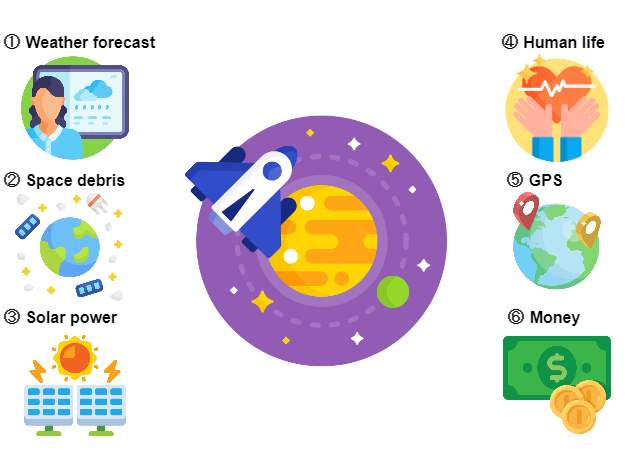
 |
Weather satellites enable more accurate weather forecasts. |
 |
Space debris is any piece of material left by humans in space. |
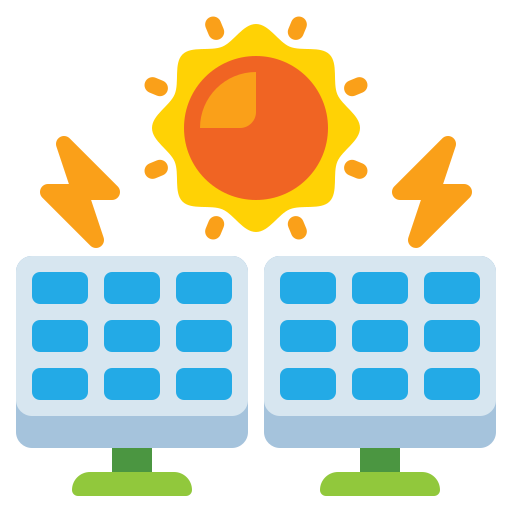 |
Solar power is the energy from the sun used as electricity. |
 |
Humans may be able to live outside of Earth in the future as space development advances. |
 |
GPS is a system that provides the location of something on Earth. |
 |
A lot of money is needed and is spent on space development. |




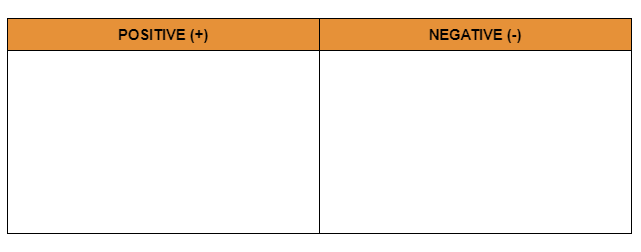



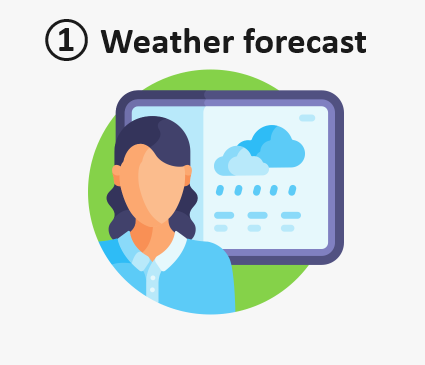
| 1. | Does space development have a positive or negative impact on “weather forecast”? |
| Answer: |
| 2. | Why do you think so? |
| Answer: |

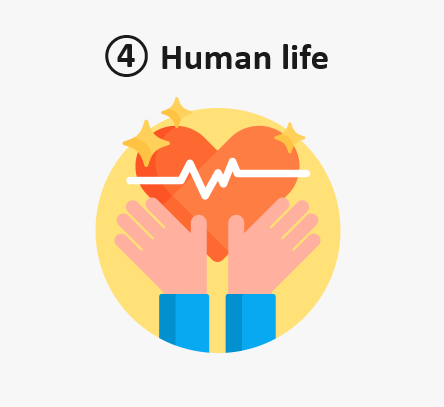
| 1. | Does space development have a positive or negative impact on “human life”? |
| Answer: |
| 2. | Why do you think so? |
| Answer: |


| 1. | Does space development have a positive or negative impact on “money”? |
| Answer: |
| 2. | Why do you think so? |
| Answer: |



You can choose as many as possible, and items that are not on the list are acceptable.


| Positive effect: I think space development has a positive effect on _________________________. Because __________________________________________________. |


| Negative effect: I think space development has a negative effect on _________________________. Because __________________________________________________. |




| Opening | Today, I am going to talk about the positive and negative effects of space development. |
| Body | Positive effect: I think space development has a positive effect on GPS. Because of space development, GPS can tell us where we are more accurately. So, we can use GPS to find places easily, and it’s very helpful!
Negative effect: |
Closing | These are the positive and negative effects of space development. Thank you for listening! |

F_4
| Opening | Today, I am going to talk about the positive and negative effects of space development. |
| Body | I think space development has a positive effect on __________________. Because ____________________________________. I think space development has a negative effect on __________________. Because ____________________________________. |
Closing | These are the positive and negative effects of space development. Thank you for listening! |




If yes, why do you want to go? What do you want to do in space?
If not, why not?
| Answer: |


If you see a shooting star, what do you wish for?
| Answer: |

kj24_flx1_2



| Nice to meet you too, ________. What did you have for breakfast today? |
| Answer: |







C_2
| What do the “rocks” represent? |
C_3
| Answer: |


C_4
| What should we put first, second, and last in the jar? |
C_5
| Answer: |



D_1
| What do the activities ①~⑧ represent in the “Jar of Life”? Tell me if they are “rocks”, “pebbles”, or “sand”. |
D_2
| ① Using your smartphone for social media ② Playing video games ③ Working for money ④ Studying |
⑤ Reading books ⑥ Eating delicious meals ⑦ Watching movies ⑧ Joining club activities |




E_1

| 1. | What activities are “rocks” for you? Tell me your own ideas. |
| 2. | Why do you think so? |
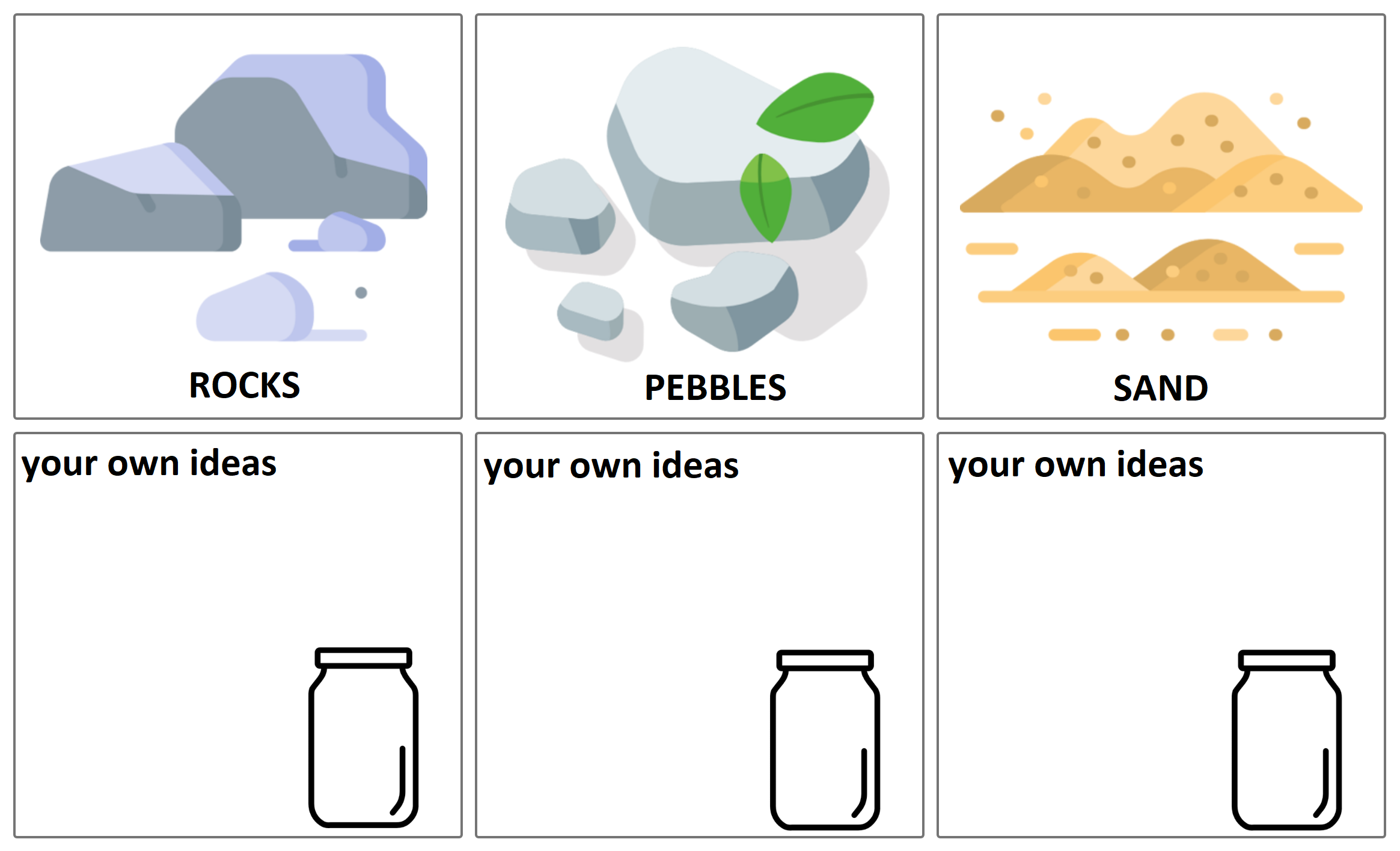
| Answer: |


| 1. | What activities are “pebbles” for you? Tell me your own ideas. |
| 2. | Why do you think so? |

| Answer: |


| 1. | What activities are “sand” for you? Tell me your own ideas. |
| 2. | Why do you think so? |

E_7
| Answer: |


E_8

| What activities do you prioritize in your daily life? Please tell me your top three priorities, the reasons why, and whether they apply to rocks, pebbles, or sand. |
| My first priority is ______________________________________. |
| Because _________________________________________________. It’s (rock/pebbles/sand) for me. |

| My second priority is ______________________________________. |
| Because _________________________________________________. It’s (rock/pebbles/sand) for me. |

| My third priority is ______________________________________. |
| Because _________________________________________________. It’s (rock/pebbles/sand) for me. |




G_2
| Opening | Today, I am going to talk about the “rocks”, “pebbles”, and “sand” in my own “Jar of Life”. |
| Body | ①(your “rocks” and the reason) ②(your “pebbles” and the reason) ③(your “sand” and the reason) |
Closing | These are the “rocks”, “pebbles”, and “sand” in my own “Jar of Life”. Thank you for listening! |

G_4
| Opening | Today, I am going to talk about the “rocks”, “pebbles”, and “sand” in my own “Jar of Life”. |
| Body | My “rocks” are ________________________________________. The reasons are ________________________________________. My “pebbles” are ________________________________________. The reasons are ________________________________________. My “sand” is ________________________________________. The reasons are ________________________________________. |
Closing | These are the “rocks”, “pebbles”, and “sand” in my own “Jar of Life”. Thank you for listening! |



H_1

H_2
H_3
| Answer: |


H_4
| Answer: |

kj24_flx1_1



| Answer: |



| How do you use the following phrases? Talk about each of them, and then sort them into categories A to F below. |
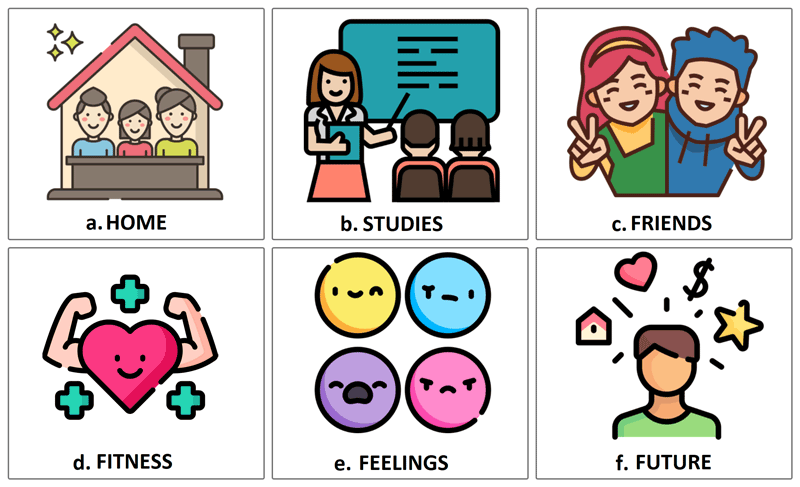
| ① Have breakfast. ② Spend less. ③ Try new things. |
④ Give it your all. ⑤ Be kind. ⑥ Have a good night’s sleep. |




| 1. | How do you use the phrase? |
| 2. | When do you use it? |
| Answer: |


| 1. | How do you use the phrase? |
| 2. | When do you use it? |
| Answer: |


| 1. | How do you use the phrase? |
| 2. | When do you use it? |
| Answer: |




| Imagine talking to a classmate or teacher about studies or exams. Try to make your own phrases that can be used. |
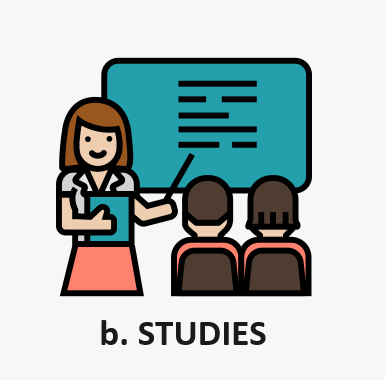
| Your own phrase:___________________________________ |


| Imagine talking to your friend about what you are working on or doing your best. For example, club activities. Try to make your own phrases that can be used. |

| Your own phrase:___________________________________ |


| Imagine talking to your friends, family or a teacher about your future. Try to make your own phrases that can be used. |

| Your own phrase:___________________________________ |



| 1. | What is your favorite phrase? |
| Answer: |
| 2. | How do you use the phrase? |
| Answer: |
| 3. | When do you use it? |
| Answer: |
| 4. | Why do you like the phrase? |
| Answer: |


Then, let’s give a presentation. I will read a sample presentation first.



_______________________________________________________________________
_______________________________________________________________________





| Answer: |



| Answer: |




| Situation 1: |
With the help of your friends, you were able to get good scores in exams. Show your gratitude to your friends.
(Your tutor will pretend to be your friend.)
|
| Phrase to mention: | “Thank you for everything!” |
G_3
| Answer: |


| Situation 2: |
Your friend is worried about the competition. Encourage your friend before the competition.
(Your tutor will pretend to be your friend.)
|
| Phrase to mention: | “You can do it!” |
| Answer: |


| Situation 3: |
You are making a call to a friend who is sick. Wish him/her well.
(Your tutor will pretend to be your sick friend.)
|
| Phrase to mention: | “Hope you feel better soon.” |
| Answer: |




| Answer: |


Do you stay up late at night to study?
| Answer: |

24hsrk_jh3_10



| Answer: |



B_1
B_2
 |
trade
貿易
|
 |
import
輸入する
|
 |
sell – sold
(sellの過去分詞)売られた
|
 |
interdependent
たがいに依存する
|


B_3

C_1
Think about the good and bad points of domestic and imported vegetables.
国産野菜と輸入野菜の良い点、悪い点を考えてみましょう。


C_2
| Answer: |


C_4
| Answer: |


| Answer: |


C_8
Use the phrases to express your agreement or disagreement.
次に、国産野菜と輸入野菜について、あなたの意見を聞かせてください。
賛成、反対を表現するフレーズを使いましょう。
I think it’s better to buy domestic vegetables because we can support domestic farmers. What do you think?

| Answer: |


C_10

| Answer: |




For example, one-third of the chicken we eat is imported from countries like Thailand and Brazil. Fried chicken would be expensive in Japan if we didn’t import it from these countries. Also, we import about 90 percent of shirts, pants, coats, and other clothing products from China and other Asian countries.
Many of the products sold by Japanese companies are produced in foreign countries. Electronic gadgets, too.
There is an increasing relationship between us and other countries. Beyond our borders, we must continue to help one another.


D_3


| Where is one-third of the chicken we eat imported from? |
| Answer: |


| What must we do beyond our borders? |
E_5
| Answer: |


E_6


| Did you know that our lives are surrounded by products imported from overseas? |
| Answer: |


| If we did not import meat from overseas, what food could we not eat? |
F_5
| If we _____ not import meat from overseas, we ______ not eat _____________. |


| Which do you think is better, domestic products or imported ones? Why do you think so? cheap – expensive safer or not good or not good for the environment |
| Answer: |


F_8
| What can we do to build good relationships with people from overseas? |
F_9
| Answer: |


F_10



What do you want to try this year?
G_3
| Answer: |


| Answer: |

24hsrk_jh3_9



| Answer: |



B_1
B_2
 |
Japanese school backpack
ランドセル
|
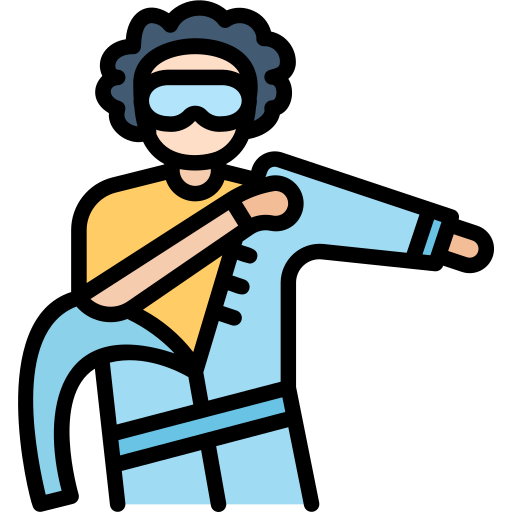 |
wear
背負う、着る
|
 |
donate
寄付する
|
 |
definitely
確かに、ぜひ
|


B_3

C_1
Let’s look at where they are from and their languages.
100人の出身地と言語を見てみよう。


C_2
Please read aloud the following sentences.
次の文章を声に出して読みましょう。
| 14 people from the Americas. |
| 10 people from Europe. |
| 15 people from Africa. |
| 60 people from Asia. |
| 1 person from Oceania. |


| If the world were a village of 100 people, how many would be from Asia? |
| Answer: |



Please read aloud the following sentences.
次の文章を声に出して読みましょう。
| 12 people speak Mandarin. |
| 6 people speak Spanish. |
| 5 people speak English. |
| 5 people speak Arabic. |
| 2 people speak Japanese. |
| 70 people speak other languages. |


| If the world were a village of 100 people, how many would speak Japanese? |
C_10
| Answer: |



| Answer: |



D_1

D_2
|
TUTOR:
|
Hey, Hikari. Japanese elementary school students wear Japanese school backpacks, right? |
|
STUDENT:
|
Yes, they do, Allen. Why? |
|
TUTOR:
|
I saw elementary school children yesterday. Their backpacks were colorful and cool! If I were in Japan when I was in elementary school, I would wear a Japanese school backpack! |
|
STUDENT:
|
If I still had mine, I would give it to you. But I donated mine to Cambodia. |
|
TUTOR:
|
Oh, really? That’s great! If I were a Cambodian child, I would definitely be very happy. |


D_3

D_4
|
STUDENT:
|
Hey, Hikari. Japanese elementary school students wear Japanese school backpacks, right? |
|
TUTOR:
|
Yes, they do, Allen. Why? |
|
STUDENT:
|
I saw elementary school children yesterday. Their backpacks were colorful and cool! If I were in Japan when I was in elementary school, I would wear a Japanese school backpack! |
|
TUTOR:
|
If I still had mine, I would give it to you. But I donated it to Cambodia. |
|
STUDENT:
|
Oh, really? That’s great! If I were a Cambodian child, I would definitely be very happy. |


D_5

E_1

E_2
| What would Allen do if he were in Japan when he was in elementary school? |
E_3
| Answer: |


E_4
| Why doesn’t Hikari have her Japanese school backpack? |
| Answer: |


E_6

F_1

|
Have you ever donated something? If yes, what did you donate? If not, if you had a chance, would you donate your school backpack? |
| Answer: |


| Do you think it is a great idea to donate school backpacks? Why do you think so? |
| Answer: |


| If you were at home now, what would you like to do? |
| Answer: |


| What is your wish? |
| Answer: |
I wish I had …



G_1
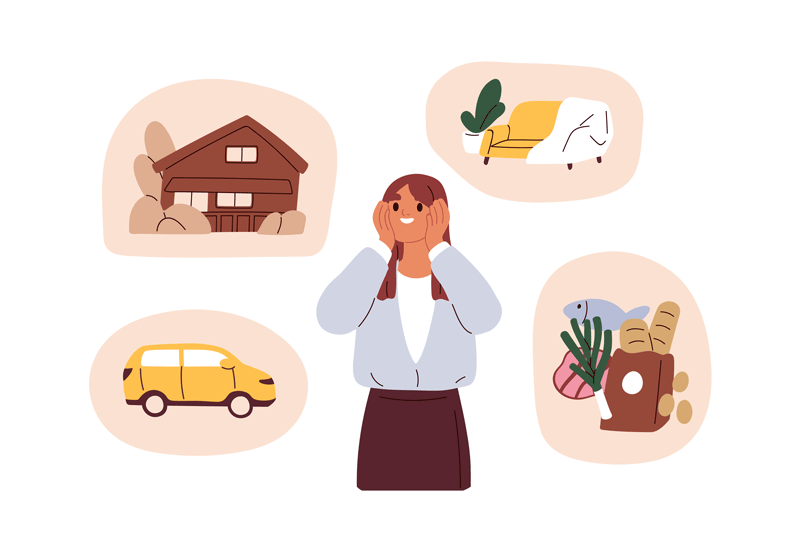

G_2
| If you were rich, what would you do or buy? Why? |
G_3
| Answer: |


| What are you going to do this weekend? |
| Answer: |


